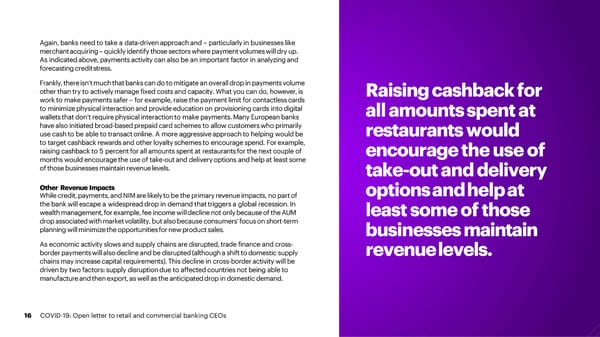Again, banks need to take a data-driven approach and – particularly in businesses like merchantacquiring–quicklyidentifythosesectorswherepaymentvolumeswilldryup. As indicated above, payments activity can also be an important factor in analyzing and forecasting creditstress. Frankly,thereisn’tmuchthatbankscandotomitigateanoveralldropinpaymentsvolume other than try to actively manage fixed costs and capacity. What you can do, however, is Raising cashback for work to make payments safer – for example, raise the payment limit for contactless cards to minimize physical interaction and provide education on provisioning cards into digital all amounts spent at wallets that don’t require physical interaction to make payments. Many European banks have also initiated broad-based prepaid card schemes to allow customers who primarily use cash to be able to transact online. A more aggressive approach to helping would be restaurants would to target cashback rewards and other loyalty schemes to encourage spend. For example, raising cashback to 5 percent for all amounts spent at restaurants for the next couple of encourage the use of months would encourage the use of take-out and delivery options and help at least some ofthosebusinessesmaintainrevenuelevels. take-out and delivery Other RevenueImpacts optionsandhelpat Whilecredit,payments,andNIMarelikelytobetheprimaryrevenueimpacts,nopartof the bank will escape a widespread drop in demand that triggers a global recession. In wealthmanagement,forexample,feeincomewilldeclinenotonlybecauseoftheAUM least some of those dropassociatedwithmarketvolatility,butalsobecauseconsumers’focusonshort-term planningwillminimizetheopportunitiesfornewproductsales. businesses maintain As economic activity slows and supply chains are disrupted, trade finance and cross- borderpaymentswillalsodeclineandbedisrupted(althoughashifttodomesticsupply revenuelevels. chains may increase capital requirements). This decline in cross-border activity will be driven by two factors: supply disruption due to affected countries not being able to manufactureandthenexport,aswellastheanticipateddropindomesticdemand. 16 COVID-19: Open letter to retail and commercial banking CEOs
 How Banks Can Manage the Business Impact: COVID-19 Page 15 Page 17
How Banks Can Manage the Business Impact: COVID-19 Page 15 Page 17